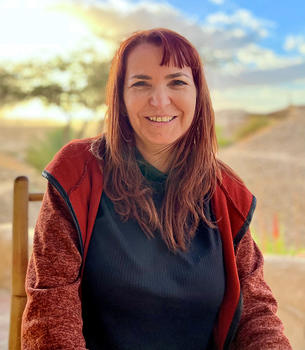In This Story

Early in her career studying psychology in her native Israel, Ronit Peled-Laskov worked with boys aged 6 to 12 in a boarding school that served as a de facto prison. The children were interred for serious criminal offenses, ranging from sex crimes to contributing to murder.
It was a unique environment, one where the boundaries of criminal responsibility blurred. As part of her studies, Peled-Laskov investigated the homes and homelife of the children, only to be horrified at what she often discovered.
“When you see what is going on there,” said the mother of three boys, “you see the neglect and you can’t believe that a child lives in this house. It was a big challenge to understand the result of the neglect in a home with the mother who is maybe an alcoholic and a father who is in jail—and it made me come to want to understand it and to help understand that young criminal.”
Peled-Laskov, now a clinical criminologist, is a visiting research scholar at the Schar School of Policy and Government at George Mason University. During her time at Mason, she will work on research projects, participate in forums, and work with graduate and undergraduate students interested in the aspects of criminology studied by the Schar School’s award-winning Center for Advancing Correctional Excellence (ACE!).
“She will work on scholarly papers on probation processes and how it affects recidivism,” said Faye Taxman, founding director of ACE!, adding that Peled-Laskov will also teach a summer course on the Israeli prison system.
Her experience at home and in the United States provides Peled-Laskov, who directs a criminal justice master’s program at Ashkelon Academic College in Israel, with insights to both incarceration systems for a comprehensive and distinctive “compare and contrast” opportunity that she will share with students.
“Ronit brings another perspective about how corrections functions in other countries and the role of recidivism,” Taxman said. “Students will gain a greater understanding of what correctional systems around the world look like and how they are similar or different from the United States.
“We can also learn about different policies that affect how corrections is used in various societies to encourage normative behavior.”
For instance, in Israel, the emphasis is on rehabilitation of criminals and dissecting the purpose of punishment; reintegration into society is foremost. That was true in the United States until the 1970s, when punitive policies gained prominence, longer sentences became the norm, and rehabilitation was sidelined.
It should come as no surprise that data shows Israel’s recidivism rates are lower than those in the United States.
In class, Peled-Laskov said, “we will talk about penology in general, about punishment, and the purpose of the rehabilitation. We’ll talk about the dilemma of what is the right way to react to someone who does crime and what is the purpose of punishing? And we discuss how hard is it to be an ex-prisoner and what problems they confront, and what are ways we can help them?”
Peled-Laskov will be at the Schar School through the summer.
